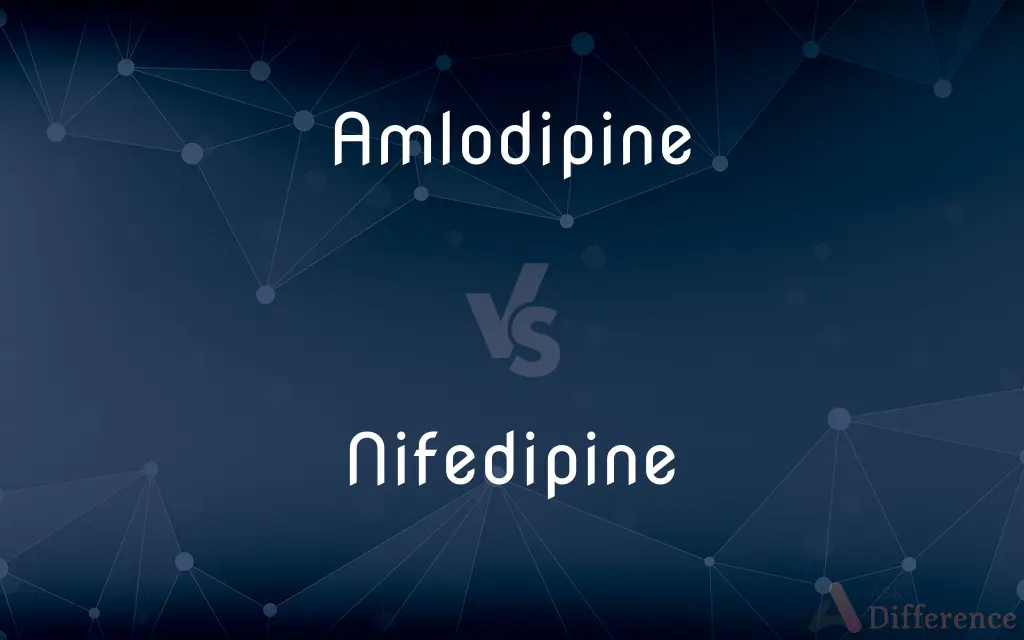Amlodipine vs. Nifedipine — What's the Difference?
By Tayyaba Rehman — Updated on October 30, 2023
Amlodipine and Nifedipine are calcium channel blockers used to treat hypertension, but they differ in their duration of action and specific uses.

Difference Between Amlodipine and Nifedipine
Table of Contents
ADVERTISEMENT
Key Differences
Amlodipine is a long-acting calcium channel blocker primarily used to treat high blood pressure and angina. It works by relaxing blood vessels, improving blood flow. Nifedipine, also a calcium channel blocker, is used for hypertension and angina but has a shorter duration of action.
While Amlodipine is often administered once daily due to its long-lasting effects, Nifedipine may require multiple doses a day, especially in its immediate-release form. This difference in dosing frequency can impact patient compliance and preference.
Amlodipine tends to have a slower onset of action, making it less suitable for acute angina attacks. Nifedipine, particularly the immediate-release form, acts faster and can be used in urgent situations to relieve chest pain.
In terms of side effects, Amlodipine may cause edema, fatigue, and dizziness. Nifedipine can cause similar side effects, but its immediate-release form has been associated with a rapid drop in blood pressure and reflex tachycardia.
Comparison Chart
Duration of Action
Long-acting
Shorter-acting
ADVERTISEMENT
Dosing Frequency
Usually once daily
Often multiple times a day
Onset of Action
Slower
Faster
Primary Uses
Hypertension, angina
Hypertension, angina
Notable Side Effects
Edema, fatigue, dizziness
Rapid BP drop, tachycardia
Compare with Definitions
Amlodipine
Often taken once daily.
She takes Amlodipine every morning.
Nifedipine
A medication used to treat hypertension.
Nifedipine was effective in lowering his blood pressure.
Amlodipine
A medication used to treat high blood pressure.
The doctor prescribed Amlodipine for her hypertension.
Nifedipine
Useful for acute angina attacks.
The doctor gave her Nifedipine for immediate relief from chest pain.
Amlodipine
A calcium channel blocker.
Amlodipine works by relaxing blood vessels.
Nifedipine
A calcium channel blocker.
Nifedipine helps in dilating blood vessels.
Amlodipine
Used to treat angina (chest pain).
Amlodipine helped alleviate his angina symptoms.
Nifedipine
May cause rapid blood pressure drop.
She felt dizzy due to the rapid drop in blood pressure after taking Nifedipine.
Amlodipine
Can cause side effects like edema.
He experienced swelling in his ankles after starting Amlodipine.
Nifedipine
Can be taken multiple times a day.
He needs to take Nifedipine twice daily.
Amlodipine
Amlodipine is a calcium channel blocker medication used to treat high blood pressure and coronary artery disease. While not typically recommended in heart failure, amlodipine may be used if other medications are not sufficient for treating high blood pressure or heart-related chest pain.
Nifedipine
Nifedipine, sold under the brand name Adalat among others, is a calcium channel blocker medication used to manage angina, high blood pressure, Raynaud's phenomenon, and premature labor. It is one of the treatments of choice for Prinzmetal angina.
Amlodipine
(pharmaceutical drug) A long-acting calcium channel blocker used as an anti-hypertensive and in the treatment of angina
Nifedipine
A calcium channel blocker drug, C17H18N2O6, that acts as a coronary vasodilator and is used primarily to treat hypertension and angina pectoris.
Nifedipine
(pharmaceutical drug) A synthetic compound which acts as a calcium antagonist and is used as a coronary vasodilator in the treatment of cardiac and circulatory disorders.
Nifedipine
Calcium blocker (trade name Procardia); appears to increase the risk of recurrent heart attacks
Common Curiosities
What is Amlodipine primarily used for?
Amlodipine is primarily used for treating hypertension and angina.
What is the main use of Nifedipine?
Nifedipine is used for treating hypertension and angina, and it can be useful for acute angina attacks.
How often is Amlodipine typically taken?
Amlodipine is typically taken once daily.
Does Amlodipine have a slow onset of action?
Yes, Amlodipine tends to have a slower onset of action.
Can Nifedipine be taken multiple times a day?
Yes, Nifedipine, especially the immediate-release form, may require multiple doses a day.
Is Nifedipine fast-acting?
Yes, particularly the immediate-release form of Nifedipine is fast-acting.
What class of drug is Nifedipine?
Nifedipine is a calcium channel blocker.
What are common side effects of Amlodipine?
Common side effects of Amlodipine include edema, fatigue, and dizziness.
Can Nifedipine cause a rapid drop in blood pressure?
Yes, especially the immediate-release form of Nifedipine can cause a rapid drop in blood pressure.
Is Nifedipine effective in urgent situations?
Yes, especially the immediate-release Nifedipine can be used in urgent situations like acute angina attacks.
Does Nifedipine have any specific side effects?
Yes, Nifedipine can cause side effects like rapid blood pressure drop and reflex tachycardia, especially in its immediate-release form.
Is Amlodipine a calcium channel blocker?
Yes, Amlodipine is a calcium channel blocker.
Are both Amlodipine and Nifedipine used for the same conditions?
Yes, both are used for hypertension and angina, but they differ in action and dosing.
Can Amlodipine cause swelling in the ankles?
Yes, one of the side effects of Amlodipine can be edema, including swelling in the ankles.
Can Amlodipine be used for acute angina attacks?
Amlodipine is less suitable for acute angina attacks due to its slower onset.
Share Your Discovery

Previous Comparison
Precept vs. Example
Next Comparison
Karaoke vs. VideokeAuthor Spotlight
Written by
Tayyaba RehmanTayyaba Rehman is a distinguished writer, currently serving as a primary contributor to askdifference.com. As a researcher in semantics and etymology, Tayyaba's passion for the complexity of languages and their distinctions has found a perfect home on the platform. Tayyaba delves into the intricacies of language, distinguishing between commonly confused words and phrases, thereby providing clarity for readers worldwide.














































